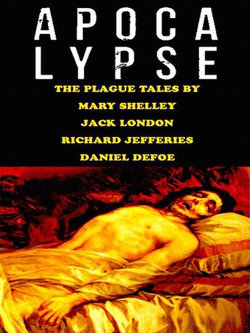Apocalypse
The Plague Tales
By
Mary Shelley
Jack London
Richard Jefferies
Daniel Defoe
Back in 1826 a novel was written, The Last Man—that tells the story of humanity’s downfall in the 21st century.
Scenes of horror increase by the hour. The disease proves unstoppable, causing the collapse of civilization. Our greatest cities become gravesites of ruin.
The author was none other than Mary Shelley, creator of the groundbreaking science-fiction/horror novel Frankenstein (1818).
And Jack London wrote science fiction.
In his The Scarlet Plague, (published 1912) it is the year 2073. Plague was killing people. People appeared not to be alarmed because they “were sure that the scientists would find a way to overcome this new germ, just as they had overcome other germs in the past.” But the plague was unstoppable. Untold millions died. Society had been set back to a nomadic existence.
After London, (published 1885) by Richard Jefferies depicts an England of the distant future in which most of humanity has either died from plague or other unnamed catastrophic events.
A Journal of the Plague Year (published 1722) is Daniel Defoe's reconstruction of the bubonic plague outbreak in the London of 1665, which claimed over 97,000 lives.
Defoe's classic reconstruction of those events is one of the most compelling accounts of natural disaster in all literature.
These four works are remarkable for their visionary audaciousness: as with H.G. Well's The Time Machine, Shelley, London, Jefferies and Defoe took the long view; and as with Well's predictions (aerial warfare, space travel, the atom bomb) they were all amazingly prescient.
JACK LONDON (1876-1916) was an activist, journalist, short-story writer, novelist, and one of the most widely translated of American authors. He was a child laborer in Oakland at 14, a Bay Area pirate at 15, a transcontinental hobo at 16, an able-bodied seaman at 17, a New York State prisoner at 18, a California ‘work beast’ at 20 and a Yukon prospector at 21. London published over 50 books, and is today most famous for The Sea Wolf, White Fang, The Call of the Wild, Martin Eden, The People of the Abyss, The Road, and John Barleycorn. His influence upon later American writers has been enormous.
DANIEL DEFOE (1660–1731) was an English writer, journalist, pamphleteer and spy, most famous for his novel Robinson Crusoe. A prolific writer, he wrote more than five hundred books, pamphlets and journals on various topics (including politics, crime, religion, marriage, psychology and the supernatural. He is best remembered for his masterworks, Robinson Crusoe, Moll Flanders, and A Journal of the Plague Year.
JOHN RICHARD JEFFERIES (1848 –1887) was an English nature writer, noted for his depiction of English life in essays, non-fiction books on natural history, and novels. The son of a Wiltshire farmer, he began his work as a reporter for the North Wiltshire Herald, and later found success through his articles written for the Pall Mall Gazette, a series of essays called The Gamekeeper at Home (1878), followed by three more collections which were first published in the Pall Mall Gazette and then in book form, including Wild Life in a Southern County and The Amateur Poacher, both appearing in 1879, and Round About a Great Estate in 1880.
MARY WOLLSTONECRAFT SHELLEY (1797-1851) wife of celebrated poet Percy Bysshe Shelley, was an English novelist, short story writer, dramatist, essayist, biographer, perhaps best known for her Gothic novel creation, Frankenstein, widely considered to be one of the top 100 books of all time. Her works remain among the most profound, and beautiful in the English language.



Share This eBook: